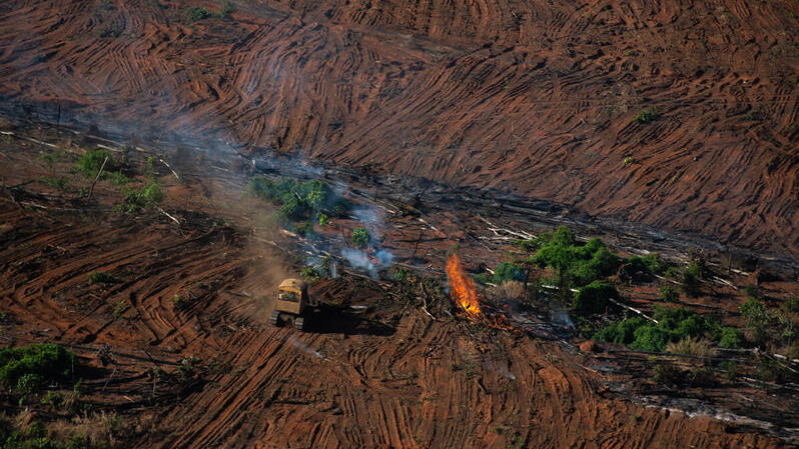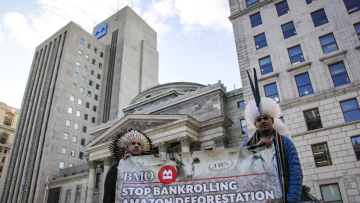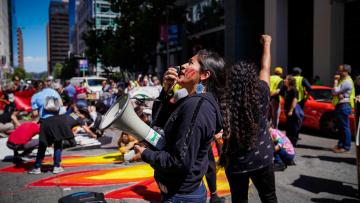Complaint filed against French banks for money laundering and concealment of proceeds from illegal deforestation in the Amazon

Sherpa, supported by Harvest, the Center for Climate Crime Analysis (CCCA), Repórter Brasil and Transparency International, filed a complaint with the French National Prosecutor’s Office against French banks BNP Paribas, Crédit Agricole, BPCE and Axa. Sherpa is calling for a criminal investigation for money laundering and concealment, due to the banks’ financial support for Brazil’s leading beef companies, which contribute to illegal deforestation in the Amazon.
This is the first criminal complaint against French banks based on the offences of laundering and receiving stolen goods, due to their financial support for activities responsible for deforestation, and the profit derived from it.
The role of French banks in laundering proceeds from illegal deforestation
Cattle farming is the main driver of deforestation in Brazil and across South America. According to the Brazilian National Institute for Space Research, deforestation of the Amazon rainforest reached its highest level in twelve years in 2021.
Despite of this, French banks continue to finance major multinational agribusiness companies in the cattle sector which have a proven track record of illegal deforestation, land grabs from indigenous peoples and forced labour in their supply chains.
Between 2013 and 2021, AXA, Crédit Agricole, BNP Paribas and BPCE made investments (1) worth nearly $70 million in three major cattle companies JBS and Marfrig (2). However, over the same period, numerous investigations developed by Repórter Brasil revealed environmental and human rights abuses in the sourcing of cattle these companies (3).
Now, a new analysis by the CCCA, based on a sample of suppliers of three JBS slaughterhouses in the state of Para between 2018 and 2021, found evidence of irregularities such as deforestation or intrusion into indigenous lands and protected forests in over 50% of those suppliers. Similar analysis for suppliers of two JBS and Marfrig slaughterhouses in the state of Mato Grosso identified indicia of irregularities in approximately 40% of the suppliers examined (4).
“This analysis underlines the prevalence of the social and environmental violations in the cattle supply chain. We have over many years been reporting on these issues, and documented how the profits of these companies could be tainted with proceeds from cattle produced on illegally deforested lands” said Fernanda Sucupira, researcher at Repórter Brasil.
Environmental crimes and money laundering
Sherpa’s complaint is the first in France to tackle the issue of criminal liability of financial institutions for laundering several environmental crimes linked to illegal deforestation in the Amazon. Money laundering, a method widely used by criminal networks, consists in either concealing the origin of illegally obtained funds making them appear to come from legitimate sources, or in assisting such operations. The Financial Action Task Force, the global money laundering and terrorist financing watchdog, has identified environmental crime as one of the most profitable criminal enterprises globally. In Brazil most of the deforestation is illegal and is often connected to other violations of criminal law such as corruption, money laundering and fraud.
BNP Paribas, Crédit Agricole, BPCE and Axa, by holding bonds issued by companies profiting from environmental crimes, are helping to reintroduce the proceeds of these offences into the legal circuit, when bonds are repaid with proceeds derived from illegal deforestation.
“French banks cannot ignore the Brazilian cattle industry’s responsibility in illegal deforestation, a massive and systemic problem. These banks would therefore have knowingly financed illegal activities. This demonstrates the need for stronger sanctions to deter banks from financing companies that profit from illegal deforestation and environmental crimes” said Jean-Philippe Foegle, Sherpa’s Advocacy and Litigation Officer.
Financial institutions have clear anti-money laundering obligations, and these need to be fully enforced when it comes to environmental crimes. In the context of the climate emergency, it is essential that these players be held criminally liable for financing and laundering the proceeds of illegal deforestation.
Notes
(1) Investments were made through the holding of bonds issued by Marfrig and JBS in the bond market. BNP Paribas also acted as a Bookrunner, Global Coordinator and Sustainability advisor in the context of the launching of Marfrig’s green bond.
(2) This allowed banks to earn $ 11,73 million profits.
(3) Infamous Connection – Reporters Brasil, Disclose, Harvest, Sherpa et le Center for Climate Crime Analysis –November 2022
(4) This analysis is based on a sample of over 60,000 properties in the supply chain of the relevant slaughterhouses, namely properties that sent cattle to the slaughterhouse (direct suppliers), properties that sent cattle to those direct suppliers (first-tier indirect suppliers), and those that sent cattle to the first-tier indirect suppliers (second-tier indirect suppliers). The analysis focuses on properties that sent cattle between 2018 and 2021 for the slaughterhouses located in Para, and between 2018 and 2019 for the slaughterhouses located in Mato Grosso.


